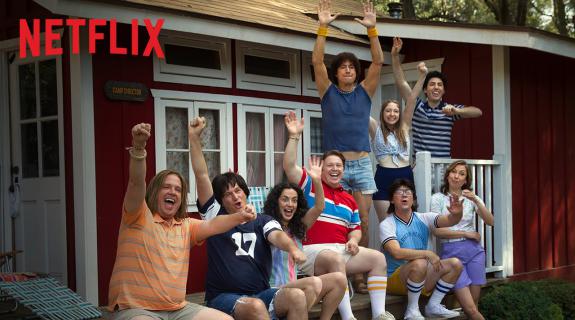The main takeaway from the showrunners panel at Netflix’s TCA presentation might be that being a showrunner is an impossible job, but if one is doing it, do it at Netflix.
Seven showrunners spoke Tuesday afternoon about Netflix metrics, creative freedom and network notes – or lack thereof.
Marvel’s Daredevil showrunner Steven DeKnight says that Netflix does not share metrics with TV creators either, but for him, “it’s liberating not having to worry about the numbers.”
Grace and Frankie’s Marta Kauffman added that it doesn’t bother her either. “Ratings aren’t a measure of success anyway,” she says, “so you do the show you want to do, do something you’re proud of and then hand it over to Netflix and they do the rest. With social media you get a whole new way of finding out who’s watching.”
Melissa Rosenberg, showrunner of Netflix’s upcoming Marvel’s Jessica Jones, says that part of the power of working at Netflix is bypassing the pilot system.
“We’re doing 13 episodes,” she says. “There’s no pilot and then getting feedback and getting reactions and ratings. You’re in this bubble. What’s the story you want to tell? What are your actors/characters, and where do you want to go with them? It’s a little scary at times but I think the most freeing experience.”
Netflix is about to premiere the prequel series for Wet Hot American Summer on July 31. When asked what the possibility is of the famous cast coming back for more installments, showrunner Michael Showalter says simply, “Sure.”
“There’s unlimited adventures that happen at camp,” he says. “I always thought of the characters almost like comic book characters like Archie and his gang. If you want to do something, you do it. Where there’s a will there’s a way.”
Showalter says getting the entire cast back together again was a surprisingly easy task. Most of the cast has worked together since the 2001 movie, so the conversation has been ongoing since then, but the real ask came with a giant group email.
“We hadn’t approached Netflix yet, we were just thinking about it,” says Showalter. “And it was a unanimous yes.”
Moving on to the dreaded concept of network notes, showrunners seem rather happy about Netflix’s input in their series.
“Netflix notes are the best I’ve ever gotten because what they do is they force you to be true to your own vision,” says Grace and Frankie’s Kauffman. “Their notes are bigger questions: ‘Is this character being true to the character you wrote?’”
BoJack Horseman’s Raphael Bob-Waksberg agrees. “Every step of the way, it’s like ‘Is this the show you want to be making?’”
Comparing Netflix to networks, the showrunners agreed that it would be a very tough move to go back to working for broadcast.
“Networks try to force you into the box that they have,” says Kauffman. “Going back to that difficult shortened storytelling would be impossible now.”
In Showalter’s case, the original film Wet Hot American Summer was largely a bust until it found a cult following. He added that Netflix was a place where he and his crew could be themselves, with Netflix pushing them “farther away from the center.”
“We had ample information that there were people that didn’t like our sensibility,” he says. “So it was kind of both shocking and exhilarating to hear ‘Be who you are’ for those of us who had been looking for a place where that voice is being supported as opposed to where we’ve always been in a margin, underground.”
Another issue regarding Netflix metrics is that when you don’t have metrics, how do you negotiate with the cast?
Kauffman, who went through the Friends negotiation where the cast got $1 million per episode, says that she prefers the Netflix way of doing things because negotiations should depend on how much people like the show, not ratings.
“Ratings are connected to advertisers, and there are no advertisers on Netflix,” says Kauffman. “I think it’s wonderful. We’re not pandering to advertisers or a network, we’re just making the show we want and we believe in. And let’s be honest, $1 million an episode is ridiculous.”
Tags:













































__twocolumncontent.jpg)











